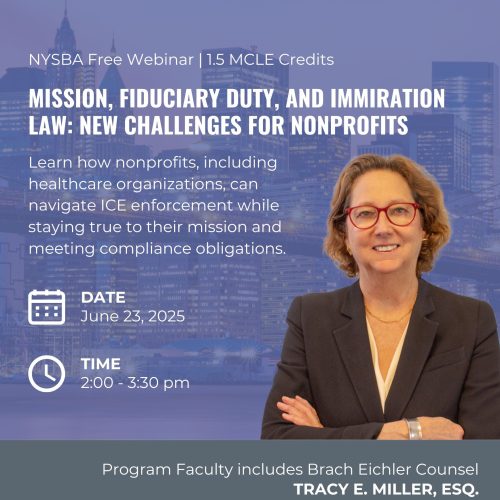Healthcare Law Alert: NJ DOH Issues Executive Directive 21-011 Setting Forth Protocols for COVID-19 Testing and Vaccination Reporting for Covered Settings
10/13/2021
On October 7, 2021, the Commissioner of the New Jersey Department of Health (DOH) issued Executive Directive (ED) 21-011, setting forth protocols for COVID-19 testing and vaccination reporting for covered settings, to supplement Governor Murphy’s Executive Orders (EO) 252, 253, and 264. By way of background, EO 252 was issued on August 6, 2021, and requires covered healthcare and high-risk congregate settings to maintain policies that require covered workers to either provide adequate proof that they have been fully vaccinated or to submit to COVID-19 testing at a minimum of one to two times weekly. EOs 253 and 264 extended similar mandatory requirements to schools and certain child care settings.
ED 21-011 applies to all healthcare facilities that are covered by EO 252, with the added inclusion of children’s residential treatment centers. Accordingly, healthcare facilities covered by ED 21-011 include: acute, pediatric, inpatient, rehabilitation, and psychiatric hospitals, including specialty hospitals, and ambulatory surgical centers; long-term care facilities; intermediate care facilities; residential detox, short-term, long-term residential substance abuse disorder treatment facilities, and children’s residential treatment centers; clinic-based settings like ambulatory care, urgency care clinics, dialysis centers, Federally Qualified Health Centers, family planning sites, and Opioid Treatment Programs, community-based healthcare settings including Program of All-inclusive Care for the Elderly, pediatric and adult medical daycare programs, and licensed home health agencies and registered healthcare service firms operating within the State.
Consistent with EO 252, covered workers for healthcare facilities include employees, both full- and part-time, contractors, and other individuals working in covered settings, including individuals providing operational or custodial services or administrative support. Under ED 21-011, covered workers do not include individuals who visit the covered setting only to provide one-time or limited-duration repairs, services, or construction.
ED 21-011 supplements EO 252 in that it provides clarification regarding the required testing frequency for unvaccinated workers. Specifically, covered settings should base their testing frequency on the extent of the virus in the community, with reference to the regional positivity rate reported in the New Jersey COVID-19 Activity Level Index (CALI) Weekly Report from the prior week. Accordingly, in the event the regional positivity rate is less than 3% (low or green), the minimum required testing frequency for unvaccinated workers in covered settings is once a week. In the event the regional positivity rate is higher than 3% but lower than 10% (moderate or yellow), the minimum required testing frequency is still once a week. However, in the event the regional positivity rate is higher than 10% (high/very high or red), the minimum required testing frequency is twice a week. If the CALI level decreases to a lower level of activity, the covered setting should continue to require the higher testing frequency level until the county positivity rate has remained at the lower activity level for at least two weeks.
Consistent with EO 252, ED 21-011 provides that the following tests are acceptable: antigen or molecular tests that have Emergency Use Authorization by the U.S. Food and Drug Administration or are operating per the Laboratory Developed Test requirements by the U.S. Centers for Medicare and Medicaid Services. Home administered tests are acceptable, with the requirement that the covered worker must make the testing results available to the covered setting. Antibody tests (also known as serology tests) are not acceptable tests for the testing requirement. Finally, concerning testing, if a covered worker seeks testing off-site and is unable to receive the test result within 48 hours due to community testing supply shortages, limited access, or inability of laboratories to process tests within 48 hours, the covered worker must submit documentation to the covered setting that the worker submitted to the required testing.
ED 21-011 also contains detailed vaccination and testing documentation and reporting requirements. These requirements are in addition to any and all existing testing reporting that is currently required. Specifically, covered settings are required to make every effort to inform covered workers about how to get vaccinated against COVID-19 and must maintain the following: documentation that unvaccinated workers were provided education regarding the benefits and potential risks associated with COVID-19 vaccination; documentation that unvaccinated workers were offered information on obtaining COVID-19 vaccination; and documentation that unvaccinated workers were either offered COVID-19 testing or information on obtaining COVID-19 testing. Each covered setting must also have a policy regarding the full COVID-19 vaccination of newly covered workers.
Covered settings must also prepare a weekly COVID-19 Immunization Status Report, which must include the following information: identification of the covered setting; the total number of covered workers; the number of covered workers who are fully vaccinated; the number of covered workers who are submitting once weekly testing; the number of covered workers who are submitting twice-weekly testing; the number of unvaccinated workers who are not in compliance with testing requirements; and actions taken by the covered setting to address noncompliance (which may include verbal warnings; written warnings; temporary suspension/unpaid leaves; and termination). The weekly report may also include the number of unvaccinated covered workers who have not been vaccinated due to a medical contraindication, as defined by the Centers for Disease Control and Prevention (CDC). Medical contraindications to the COVID-19 vaccine must be validated by requesting that the covered worker provide a written statement from a physician or advanced practice nurse. Note, documentation or other confirmation of an individual’s vaccination is medical information that must be kept confidential under applicable law and regulations.
Finally, the weekly COVID-19 Immunization Status Report must be compiled by the Tuesday of each week, beginning for healthcare facilities on October 26, 2021. A covered setting will be required to submit its status reports to the DOH if they are requested by the DOH. A covered setting that fails to abide by these documentation and reporting requirements will be considered delinquent. Delinquent facilities, among other things, may be referred to the Department of Law and Public Safety for enforcement action, as appropriate, based on the length of time delinquent, number of times delinquent, and efforts made towards compliance.
For additional information or assistance, contact:
John D. Fanburg, Managing Member and Chair, Healthcare Law, at 973-403-3107 or jfanburg@bracheichler.com
Lani M. Dornfeld, CHPC, Member, Healthcare Law, at 973-403-3136 or ldornfeld@bracheichler.com
Joseph M. Gorrell, Member, Healthcare Law, at 973-403-3112 or jgorrell@bracheichler.com
Carol Grelecki, Member, Healthcare Law, at 973-403-3140 or cgrelecki@bracheichler.com
Related Practices: Healthcare Law
Related Attorney: John D. Fanburg, Lani M. Dornfeld, Joseph M. Gorrell, Carol Grelecki












